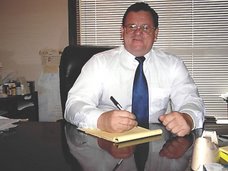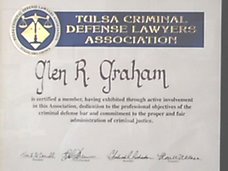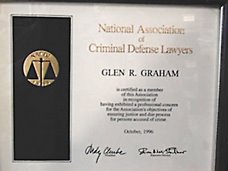Police Lying or Testilying and Complacency
by Glen R. Graham, Tulsa Criminal Defense Attorney, http://www.tulsacriminaldefenses.com or email: glengraham@icu.net
Mark Bennett, Houston Texas Criminal Defense Lawyer, in his blog on testilying describes the "everyday incidents" of police officers lying in court. The same has been recognized for years by many criminal defense lawyers in America. Defense lawyers from Irving Younger to Alan Dershowitz to even on occasion a judge or police officer have openly admitted that from time to time, police officers lie in court.
Irving Younger has said: "Every lawyer who practices in the criminal courts knows that police perjury is commonplace.;” "[T]he policeman is as likely to be indicted for perjury by his co‑worker, the prosecutor, as he is to be struck down by thunderbolts from an avenging heaven." Irving Younger, The Perjury Routine, The Nation, May 8, 1967, at 596‑97.
See Alan M. Dershowitz, Controlling the Cops; Accomplices to Perjury, N.Y. Times, May 2, 1994, at A17 ("I have seen trial judges pretend to believe officers whose testimony is contradicted by common sense, documentary evidence and even unambiguous tape recordings.... Some judges refuse to close their eyes to perjury, but they are the rare exception to the rule of blindness, deafness and muteness that guides the vast majority of judges and prosecutors.");
See, Commission to Investigate Allegations of Police Corruption and the Anti‑ Corruption Procedures of the Police Dep't, City of New York, Commission Report 36 (1994) (Milton Mollen, Chair) [hereinafter Mollen Report] wherein it stated: "Several officers also told us that the practice of police falsification in connection with such arrests is so common in certain precincts that it has spawned its own word: 'testilying."
Why are prosecutors and some judges willing to ignore police officers lying? Professor Jay Silver says: "The institutional tendency to tolerate police perjury likely stems from the prosecutor's interest in maintaining smooth working relations with police, who gather the government's evidence and are often its most important witnesses at trial, and from the prosecutor's own competitive drive to win and to advance professionally." Jay S. Silver, Truth, Justice, and the American Way: The Case Against the Client Perjury Rules, 47 Vand. L. Rev. 339, 358 n.75 (1994).
As stated by Professor Slobogin, herein below in the his law review, paraphrasizing:
----police lying intended to convict someone, whether thought to be guilty or innocent, is wrong because it diminishes ‑‑ trust in government. Police perjury damages the credibility of police testimony. The loss of police credibility on the stand diminishes law enforcement's effectiveness in the streets. To the extent other actors, such as prosecutors and judges, are perceived to be ignoring or condoning police perjury, the loss of public trust may extend beyond law enforcement to the criminal justice system generally. See, below, professor Slobogin's law review.
So, what can the criminal defense lawyer do ? Some have suggested web sites in which the citizen can post complaints about police officers. Others have suggested, video taping the officers and weeding out the bad officers. Some suggest polygraph tests of the police officer and the citizen. Polygraphs may not be admitted in a criminal case but they might be considered in a labor dispute, internal affairs matter, and in some disciplinary proceedings. Some people may consider the results of the polygraph even if they are not admissible in the criminal case in chief.
Others have suggested having the officer present the so-called "anonymous" informant to the judge, especially, upon request of the judge, when the officer seeks search warrants. A judge should have the authority to require the disclosure of information concerning bogus anonymous informants and to require their appearance before the judge in chambers before the issuance of search warrants.
It has also been proposed that an independent lay witness should be allowed to accompany the police officers during the service of a search warrant. In India this is called the panch system.
What kinds of cross examination questions can the defense lawyer attempt to ask the police officer:
Officer what is “testilying”?
Officer, do you know the name of any officers in your department who have received any discipline for testilying?
Officer do you know of any officer in your department who has ever being prosecuted, fired, or convicted for testilying?
Officer would you be willing to submit to a lie detector test administered by an independent lie detector administrator?
Officer what is the “code of silence” between fellow police officers?
Officer, do you agree that a police officer being indicted for perjury by his co worker, the prosecutor, is about as likely as being struck down by thunderbolts?
Officer, do you know the name of any police officer in your department who has ever received a promotion or positive reward for breaking the "code of silence" against fellow police officers?
Some of the following ideas are from "Reform the Police" by Christopher Slobogin, University of Colorado Law Review (Fall 1996), cite as: 67 U.Colo.L.Rev. 1037 (1996).
Lying to convict the innocent is undoubtedly rejected by most police, as well as by others, as immoral and unjustifiable. In contrast, lying intended to convict the guilty‑‑in particular, lying to evade the consequences of the exclusionary rule ‑‑ is so common and so accepted in some jurisdictions that the police themselves have come up with a name for it: "testilying." See, Commission to Investigate Allegations of Police Corruption and the Anti‑ Corruption Procedures of the Police Dep't, City of New York, Commission Report 36 (1994) (Milton Mollen, Chair) [hereinafter Mollen Report] ("Several officers also told us that the practice of police falsification in connection with such arrests is so common in certain precincts that it has spawned its own word: 'testilying."').
Police perjury sometimes occurs in connection with the police reports. Although not technically testimony, police know these reports may be dispositive in a case resolved through plea bargaining, and can be compared to testimony in cases that aren't. As a result, "reportilying" also appears to be pervasive in some jurisdictions. The Mollen Commission, for instance, described how narcotics police "falsify arrest papers to make it appear as if an arrest that actually occurred inside a building [in violation of departmental regulations] took place on the street." Professor Stanley Fisher has also documented prolific use of the "double filing" system, in which the official police file forwarded to the prosecution and provided to the defense is cleansed of exculpatory facts or possible impeachment evidence.
Prosecutors put up with perjury because they need a good working relationship with the police to make their cases.
Additionally, at bottom, some prosecutors probably agree with the police that the end justifies the means. To the extent judges ignore obvious perjury, it is probably for the same reasons attributable to the prosecutor: sympathy for the police officer's ultimate goal and, as Professor Morgan Cloud put it, "tact"‑‑the fact that "[j]udges simply do not like to call other government officials liars‑‑especially those who appear regularly in court." Morgan Cloud, The Dirty Little Secret, 43 Emory L.J. 1311, 1323‑24 (1994).
Officers should be commended and promoted for their efforts to prevent testilying. The rewards would have to be significant to break the code of silence followed by the police. The challenge is there to try to correct this problem.
What will you do?
Yours in the Defense of Fellow Human Beings,
Glen R. Graham, Attorney at Law, Tulsa Criminal Defense Lawyer, Tulsa, Oklahoma





